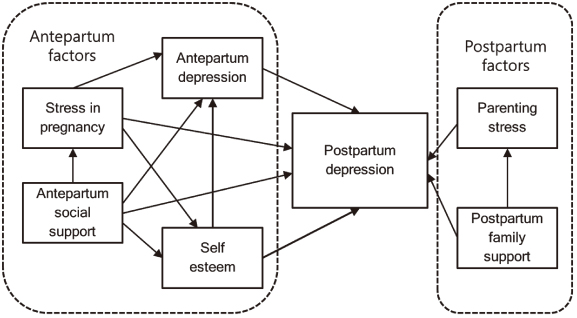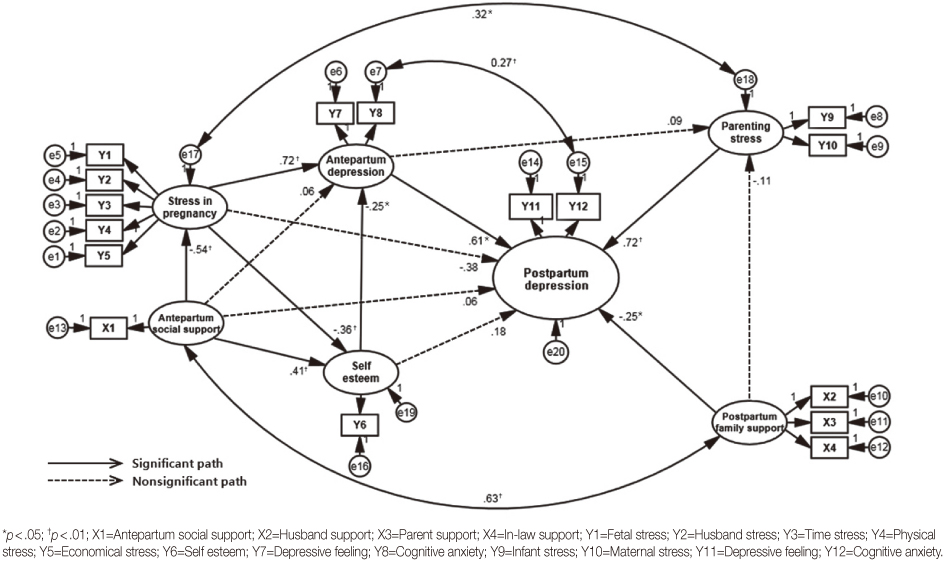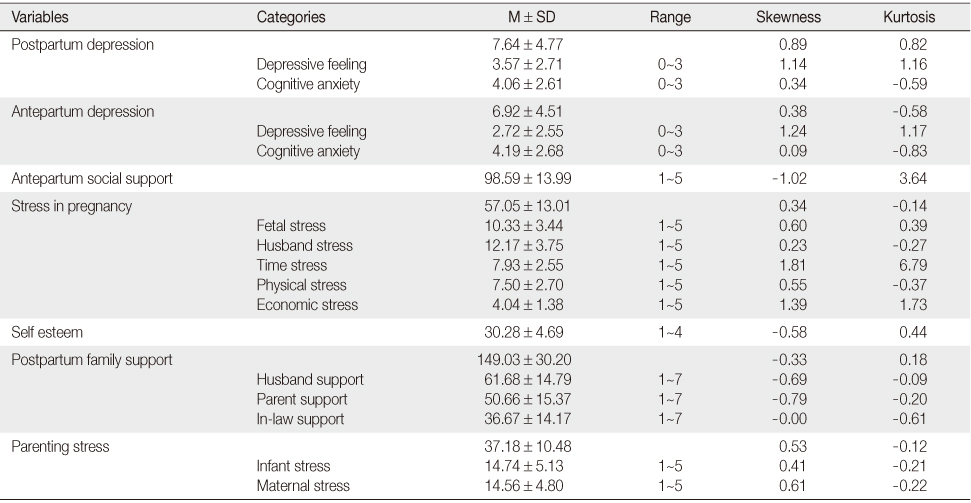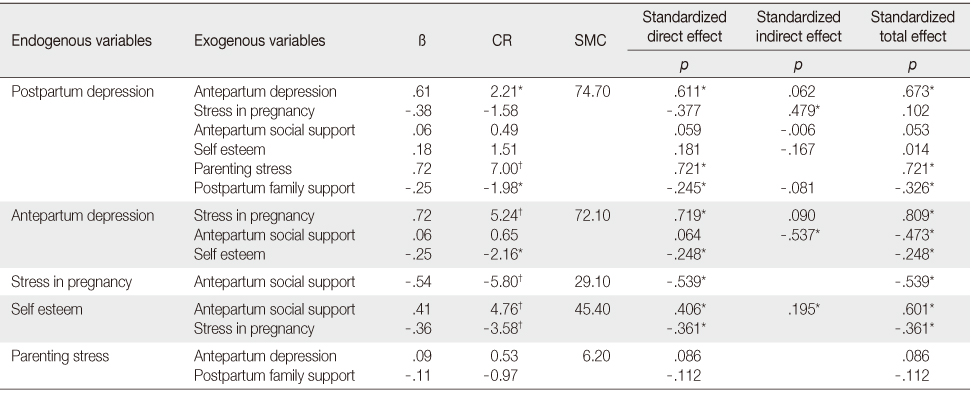Articles
- Page Path
- HOME > J Korean Acad Nurs > Volume 45(2); 2015 > Article
-
Original Article
- Development of a Prediction Model for Postpartum Depression: Based on the Mediation Effect of Antepartum Depression
- Eun Joo Lee, Jeong Sook Park
-
Journal of Korean Academy of Nursing 2015;45(2):211-220.
DOI: https://doi.org/10.4040/jkan.2015.45.2.211
Published online: April 30, 2015
1Department of Nursing, Kyungnam University, Changwon, Korea.
2College of Nursing, Keimyung University, Daegu, Korea.
- Address reprint requests to: Park, Jeong Sook. College of Nursing, Keimyung University, 1095 Dalgubeoldae-ro, Dalseo-gu, Daegu 704-701, Korea. Tel: +82-53-580-3907, Fax: +82-53-580-3916, jsp544@gw.kmu.ac.kr
© 2015 Korean Society of Nursing Science
This is an Open Access article distributed under the terms of the Creative Commons Attribution NoDerivs License. (http://creativecommons.org/licenses/by-nd/4.0/) If the original work is properly cited and retained without any modification or reproduction, it can be used and re-distributed in any format and medium.
Abstract
-
Purpose
- This study was done to develop a prediction model for postpartum depression by verifying the mediation effect of antepartum depression. A hypothesized model was developed based on literature reviews and predictors of postpartum depression by Beck.
-
Methods
- Data were collected from 186 pregnant women who had a gestation period of more than 32 weeks and were patients at a maternity hospital, two obstetrics and gynecology specialized hospitals, or the outpatient clinic of K medical center. Data were analysed with descriptive statistics, correlation and exploratory factor analysis using the SPSS/WIN 18.0 and AMOS 18.0 programs.
-
Results
- The final modified model had good fit indices. Parenting stress, antepartum depression and postpartum family support had statistically significant effects on postpartum depression, and defined 74.7% of total explained variance of postpartum depression. Antepartum depression had significant mediation effects on postpartum depression from stress in pregnancy and self-esteem.
-
Conclusion
- The results of this study suggest that it is important to develop nursing interventions including strategies to reduce parenting stress and improve postpartum family support in order to prevent postpartum depression. Especially, it is necessary to detect and treat antepartum depression early to prevent postpartum depression as antepartum depression can affect postpartum depression by mediating antepartum factors.
This manuscript is a revision of part of the first author's doctoral dissertation from Keimyung University.
- 1. Smith M, Jaffe J. Depression in women: Causes, symptoms, treatment, and self-help [Internet]. Santa Monica, CA, Helpguide. 2014;cited 2014 March 3. Available from: http://www.helpguide.org/articles/depression/depression-in-women.htm
- 2. Centers for Disease Control and Prevention. Depression among women of reproductive age [Internet]. Atlanta, GA, Author. 2013;cited 2014 April 11. Available from: http://www.cdc.gov/reproductivehealth/Depression/
- 3. Park YJ, Shin HJ, Ryu HS, Cheon SH, Moon SH. The predictors of postpartum depression. J Korean Acad Nurs. 2004;34(5):722–728.ArticlePDF
- 4. Cho HJ, Choi KY, Lee JJ, Lee IS, Park MI, Na JY, et al. A study of predicting postpartum depression and the recovery factor from prepartum depression. Korean J Perinatol. 2004;15(3):245–254.
- 5. Beck CT. Predictors of postpartum depression: An update. Nurs Res. 2001;50(5):275–285.PubMed
- 6. Youn JH, Jeong IS. Predictive validity of the postpartum depression predictors inventory-revised. Asian Nurs Res. 2011;5(4):210–215. Article
- 7. Robertson E, Grace S, Wallington T, Stewart DE. Antenatal risk factors for postpartum depression: A synthesis of recent literature. Gen Hosp Psychiatry. 2004;26(4):289–295. ArticlePubMed
- 8. Kim JY, Kim JG. Psycho-social predicting factors model of postpartum depression. Korean J Health Psychol. 2008;13(1):111–140.Article
- 9. Cho HW, Woo JY. The relational structure modeling between variables related with postpartum depression. Korean J Couns Psychother. 2013;25(3):549–573.
- 10. Leigh B, Milgrom J. Risk factors for antenatal depression, postnatal depression and parenting stress. BMC Psychiatry. 2008;8:24ArticlePubMedPMCPDF
- 11. Bae JY. Construction of a postpartum depression model. J Korean Acad Psychiatr Ment Health Nurs. 2002;11(4):572–587.ArticlePDF
- 12. Kim KS, Kam S, Lee WK. The influence of self-efficacy, social support, postpartum fatigue and parenting stress on postpartum depression. J Korean Soc Matern Child Health. 2012;16(2):195–211.Article
- 13. Chandran M, Tharyan P, Muliyil J, Abraham S. Post-partum depression in a cohort of women from a rural area of Tamil Nadu, India Incidence and risk factors. Br J Psychiatry. 2002;181:499–504.ArticlePubMed
- 14. Cox JL, Holden JM, Sagovsky R. Detection of postnatal depression Development of the 10-item Edinburgh postnatal depression scale. Br J Psychiatry. 1987;150:782–786.ArticlePubMed
- 15. Han K, Kim M, Park JM. The Edinburgh postnatal depression scale, Korean version: Reliability and validity. J Korean Soc Biol Ther Psychiatry. 2004;10(2):201–207.
- 16. Park JW. A study to development a scale of social support. J Nurs Sci. 1986;9(1):22–31.
- 17. Song JM. In the parenting stress situation, the effect of social support to parental perceptions of child behavior [master's thesis]. Seoul, Sookmyoung Women's University. 1992.
- 18. Ahn HL. An experimental study of the effects of husband's supportive behavior reinforcement education on stress relief of primigravidas. J Nurs Acad Soc. 1985;15(1):5–16.ArticlePDF
- 19. Jo JA, Kim YH. Mothers' prenatal environment, stress during pregnancy, and children's problem behaviors. J Hum Ecol. 2007;11(2):43–62.
- 20. Rosenberg M. Society and the adolescent self-image. Princeton, NJ: Princeton University Press; 1965.
- 21. Jon BJ. Self-esteem: A test of its measurability. Yonsei Forum. 1974;11(1):107–130.
- 22. Lee J, Nam S, Lee MK, Lee JH, Lee SM. Rosenberg' self-esteem scale: Analysis of item-level validity. Korean J Couns Psychother. 2009;21(1):173–189.
- 23. Hopkins J, Campbell SB, Marcus M. Role of infant-related stressors in postpartum depression. J Abnorm Psychol. 1987;96(3):237–241.ArticlePubMed
- 24. Cutrona CE. Social support and stress in the transition to parenthood. J Abnorm Psychol. 1984;93(4):378–390.ArticlePubMed
- 25. Cheon JA. The effect of postpartum stress and social network on the postpartum [master's thesis]. Seoul, Korea University. 1990.
- 26. Kwon JH. A test of a vulnerability-stress model of postpartum depression. Korean J Clin Psychol. 1997;16(2):55–66.
- 27. Silva R, Jansen K, Souza L, Quevedo L, Barbosa L, Moraes I, et al. Sociodemographic risk factors of perinatal depression: A cohort study in the public health care system. Rev Bras Psiquiatr. 2012;34(2):143–148.ArticlePubMed
- 28. American Psychiatric Association. Diagnostic and statistical manual of mental disorders. 5th ed. Washington, DC: American Psychiatric Press, Inc.; 2013.
- 29. Lee MK. A structural model for depression during pregnancy [dissertation]. Daejeon, Eulji University. 2014.
- 30. Choi MR, Lee IH. The moderating and mediating effects of self-esteem on the relationship between life stress and depression. Korean J Clin Psychol. 2003;22(2):363–383.
REFERENCES
Figure & Data
REFERENCES
Citations

- Latent profiles of depression and post-traumatic growth and their associations with social support and religious participation in mothers of children with developmental disabilities in South Korea
Soo Kyung Park, Haenim Lee
Research in Developmental Disabilities.2026; 169: 105235. CrossRef - Domestic Violence Experience, Past Depressive Disorder, Unplanned Pregnancy, and Suicide Risk in the First Year Postpartum: Mediating Effect of Postpartum Depression
Mi-Sun Lee, Jung Jae Lee, Hooyeon Lee
Psychiatry Investigation.2024; 21(10): 1129. CrossRef - High-risk Pregnancy Nursing: Analyzing the Impact of Prenatal Stress, Maternal-Fetal Attachment, and Social Support on Prenatal Depression
Jae Hui Choe, Sun Jeong Yun, Hye Young Kim
The Open Nursing Journal.2024;[Epub] CrossRef - Are the effects of stress on antenatal depression mediated by self-esteem and moderated by social support?: a cross-sectional study
Eunjoo Lee
Women's Health Nursing.2024; 30(4): 299. CrossRef - Postpartum Depression and Health: Role of Perceived Social Support among Pakistani Women
Samrah Jamshaid, Najma Iqbal Malik, Irfan Ullah, Sundas Saboor, Fauzia Arain, Domenico De Berardis
Diseases.2023; 11(2): 53. CrossRef - Do taegyo practices, self-esteem, and social support affect maternal-fetal attachment in high-risk pregnant women? A cross-sectional survey
Da-In Kang, Euna Park
Korean Journal of Women Health Nursing.2022; 28(4): 338. CrossRef - Body Appreciation, Depressive Symptoms, and Self-Esteem in Pregnant and Postpartum Brazilian Women
Juliana Fernandes Filgueiras Meireles, Clara Mockdece Neves, Ana Carolina Soares Amaral, Fabiane Frota da Rocha Morgado, Maria Elisa Caputo Ferreira
Frontiers in Global Women's Health.2022;[Epub] CrossRef - Depression and stress in Korean parents: A cohort study
Hyeji Yoo, Sukhee Ahn, Jiwon Oh, Seyeon Park, Jisoon Kim, Minseon Koh
Applied Nursing Research.2021; 62: 151519. CrossRef - Factors influencing prenatal and postpartum depression in Korea: a prospective cohort study
Hyeji Yoo, Sukhee Ahn, Seyeon Park, Jisoon Kim, Jiwon Oh, Minseon Koh
Korean Journal of Women Health Nursing.2021; 27(4): 326. CrossRef - Edinburgh Postnatal Depression Scale used in South Korea
Rora Oh, Young-Ho Khang, Yu-Mi Kim
Journal of the Korean Medical Association.2021; 64(10): 699. CrossRef - Relation between Mother’s Taekyo, Prenatal and Postpartum Depression, and Infant’s Temperament and Colic: A Longitudinal Prospective Approach
Kyung-Sook Bang, Insook Lee, Sungjae Kim, Yunjeong Yi, Iksoo Huh, Sang-Youn Jang, Dasom Kim, Sujin Lee
International Journal of Environmental Research and Public Health.2020; 17(20): 7691. CrossRef - Longitudinal Relationship Study of Depression and Self-Esteem in Postnatal Korean Women Using Autoregressive Cross-Lagged Modeling
Jeong-Won Han, Da-Jung Kim
International Journal of Environmental Research and Public Health.2020; 17(10): 3743. CrossRef - The Effects of Neuroticism on Postpartum Depression: A Dual Mediating Effect of Gratitude and Parenting Stress
Yuji Lee, Myoung-Ho Hyun
Stress.2019; 27(2): 191. CrossRef - Adverse Childhood Experiences and Postpartum Depression in Home Visiting Programs: Prevalence, Association, and Mediating Mechanisms
Joshua P. Mersky, Colleen E. Janczewski
Maternal and Child Health Journal.2018; 22(7): 1051. CrossRef - Development and Validation of a Postpartum Care Mobile Application for First-time Mothers
Ju Yeon Lee, Hye Young Kim
Korean Journal of Women Health Nursing.2017; 23(3): 210. CrossRef


Figure 1
Figure 2
Descriptive Statistics of Variables (N=186)
Correlation among Variables (N=186)
*p<.05; †p<.01.
Standardized Direct, Indirect, and Total Effects for the Final Model
*p<.05; β=Standardized regression weight; CR.=Critical ratio; SMC=Squared multiple correlation (R2).
*
*
 KSNS
KSNS
 E-SUBMISSION
E-SUBMISSION





 Cite
Cite

